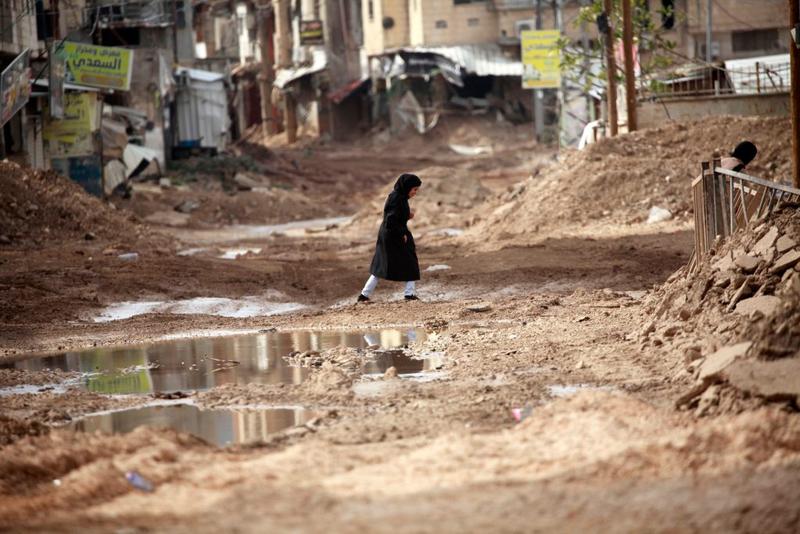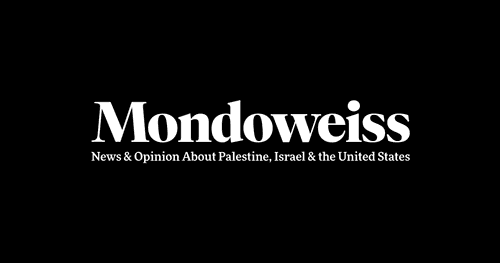The Israeli army expanded its ongoing offensive in the northern West Bank to include the town of Qabatiya on Sunday, the second-largest town in the Jenin governorate, six kilometers south of Jenin city. The Israeli army pushed armored vehicles into the town in the early hours of Sunday morning and began demolishing a series of stores at the town’s entrance. According to residents, Israeli bulldozers immediately started to tear out water pipelines in the streets and demolished the outside wall of a historic cemetery containing a memorial for the tombs of 45 Iraqi soldiers who were killed defending Jenin in the 1967 War.
Following the beginning of the Israeli attack on Qabatiya, Israel’s war minister Israel Katz, announced the expansion of the “Iron Wall” offensive to Qabatiya in a written statement. Katz also admitted that Israeli forces had expelled 40,000 Palestinians from three refugee camps in Jenin and Tulkarem, a figure reported by UNRWA weeks ago.
Katz said the refugee camps were now “empty of residents” and that “UNRWA activity in the camps has also been stopped,” asserting that he had instructed the Israeli army not to allow the residents of the camps to return to their homes for an entire year. “We will not return to the reality that was in the past,” he said. “We will continue to clear refugee camps and other terror centers to dismantle the battalions and terror infrastructure.”
Meanwhile, in Jenin city, the Israeli army deployed tanks for the first time in 23 years in the West Bank. Several Israeli Merkava tanks were spotted in the surroundings of Jenin as the Israeli army announced deploying an armored division from its 188th brigade.
The refugee camps of Jenin, Tulkarem, and Nur Shams have been the site of ongoing armed resistance against Israeli forces for the past three years, which has come under a harsh Israeli crackdown since October 2023. Since then, the Israeli army has expanded its offensive throughout the entire northern West Bank, as armed resistance spreads from the cities to the countryside.
Destruction in Qabatiya
In Qabatiya, the Israeli attack’s impact on life was immediate and devastating. Iyas Sabaaneh, director of the town’s primary school, told Mondoweiss that “we were forced to suspend classes because most of the teachers are from outside Qabatiya and they couldn’t come. The army has sealed off the town’s entrances and bulldozed the roads leading to it. And it has imposed a curfew on the town since the beginning of the offensive.”
“We have 700 children at our school, and the secondary school in the town has 450 students, which also suspended classes,” Sabaaneh added. “The occupation has bulldozed many streets and destroyed water pipes, causing some areas to flood and cutting running water from all of the eastern parts of Qabatiya.”
Sabaaneh said that the Israeli army had raided several homes in the town and turned them into military posts, forcing its inhabitants to leave. “The occupation’s bulldozers demolished the surroundings of a medical center, the courthouse, the municipality, the old mosque, and our schools,” he said.
The marketplace in Qabatiya, which is the main source for purchasing produce for dozens of villages south of Jenin and north of Nablus, is completely closed. “This not only affects the population’s access to food, but also the farmers in the surrounding region who can’t come to sell their produce,” Sabaaneh explained. “Many of Qabatiya’s residents are farmers who can’t access their lands now.” He added that thousands of crops, especially strawberries, citrus, and thousands of chickens, all of which rely upon automated irrigation systems and electricity, are “at immediate threat of dying as water and electricity are cut off.”
Expanding offensive accompanied by Israeli escalation on all fronts
Israel’s ongoing escalation in the West Bank has received the support of Israeli leaders from across the political spectrum. On Monday, Israeli opposition leader Benny Gantz said that Israel must send more forces to the West Bank.
Meanwhile, Israeli Prime Minister Benjamin Netanyahu announced further escalation in the region. In a speech at a graduation ceremony for Israeli army officers, Netanyahu stated on Sunday that Israel will maintain its forces on the Syrian Mount al-Sheikh and in the Syrian territories it occupied since the collapse of the Assad regime last December. Netanyahu also stressed that Israel will not allow any military presence by the new Syrian army south of Damascus.
Simultaneously, Israeli warplanes bombed several locations in the south of Lebanon and in the Lebanese Bekaa Valley on Sunday during the funeral ceremony of Hezbollah leaders Hasan Nasrallah and Hashem Safiyuddin in Beirut. Israeli warplanes also flew over the crowds participating in the funeral at low altitude.
Israel’s escalation on all fronts comes at the same time that Netanyahu’s government maneuvers to avoid moving into negotiations with Hamas over the second phase of the ceasefire deal in Gaza, which would include the end of the war.
On Monday, the Israeli daily newspaper Haaretz reported that Netanyahu had presented a plan to U.S. Middle East envoy Steve Witkoff that includes the release of all remaining Israeli captives in Gaza in one single batch — without moving on to a second phase of the ceasefire agreement. According to Haaretz, Netanyahu hopes that the U.S. will pressure Hamas to accept an extension of the first phase and avoid moving to negotiations over the end of the war.
Last week, Netanyahu suspended the release of 600 Palestinian prisoners after Israel received three captives and four dead bodies released by Hamas in Gaza. Netanyahu’s office said that the reason was Hamas’s “degrading” release ceremonies, while Hamas accused Netanyahu of trying to escape the obligations agreed upon in the ceasefire deal.



